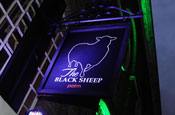The Pilot name is now long gone, due to legal wranglings with the pen company of the same name, and Palm's handheld computer devices have since evolved into mobile phones, GPS and camera devices, released mainly under the Treo moniker.
However, along with the Pilot name, Palm has arguably lost its way in the brand stakes against rivals RIM, producer of the BlackBerry, leading mobile handset manufacturer Nokia, and Apple's much-hyped iPhone.
By the company's own admission, Palm has a great deal of work to do to make amends.
BlackBerry's advertising agency Albion has been positioning it as a brand not just for business users obsessed with checking their email on the move, but for a mass consumer audience across Europe. It has run press, outdoor, taxi and online ads highlighting the flexibility, lightness and usability of the devices.
The BlackBerry Storm, the first touch-screen smartphone produced by the brand, has resulted in a raft of headlines in the technology pages of the national press heralding it as a viable challenger to the iPhone. Vodafone, which has tied up the exclusive network rights to the device in the UK, is said to be spending £6m on a prominent ad campaign for it.
Palm is planning to fight back, however, with the emergence into the fray of EMEA marketing director, Simon Lloyd, who joined the company at the beginning of October. As a former Nokia marketer, Lloyd has excellent knowledge of the competition. He admits that Palm's European marketing has been dormant, but pledges to win ground from the brand's well-known rivals.
Lloyd intends to use creative agency RKCR/Y&R, which picked up the pan-European business last year, and other agencies across Europe covering digital, retail and experiential marketing activity, to effect this shift.
Observers claim there is hope for Palm yet, albeit from a business audience. Digital agency BLM Quantum says its client T-Mobile is continuing to spend heavily on marketing, as people want the highest- quality mobile handsets despite having less disposable income. The agency's head of digital planning, Gavin Reeder, adds: 'It is usability rather than brand that will be the key factor. Palm needs to create advocacy quickly, which will create marketing traction. People who are savvy in technology go to trusted technology resources. Palm needs to drive advocacy among that group of technology influencers.'
Telecoms experts claim Palm faces its biggest challenge to date. Ben Wood, of market analyst CCS Insight, describes Palm as a 'great survivor' in the sector, but maintains that it has to increase brand awareness outside of its home market - the US. 'In Europe, Palm has relied on its relationship with independent distributors, Vodafone in particular, to maintain a position in the market. To be honest, I had written Palm off a few months ago,' he says.
Nonetheless, Wood now says that this judgement may have been 'premature', as the recent launch of the Palm Treo Pro marked a step up in the company's design and marketing efforts. He claims Apple's influence on the device is clear, even down to the packaging, which bears an 'uncanny resemblance to the iPhone'.
The Treo Pro, a business handset which is being positioned as a rival for the Nokia E71 and the BlackBerry Bold, also generated a buzz with an unusual ticketed launch event open to the public. For five nights, Brick Lane's Truman Brewery was renamed The Black Sheep and hosted a series of celebrity 'audience with' nights.
When it comes to the forthcoming agenda for Palm, Lloyd is pledging to better engage consumers through stronger retail marketing and digital activities, in conjunction with key creative work from RKCR/Y&R. As an initial step, Palm is appointing its first formal roster of agencies to bring together above-the-line activity with a below-the-line marketing push.
The company also plans to bring imaginative consumer activity to focus on new products, and is rolling out a software platform based on the Linux operating system on its devices, with the promise of major technological innovation for 2009.
Ed Colligan, Palm's president and chief executive, recently said the business remains mid-trans-formation in its quest to become the 'leading innovator in the smartphone marketplace'.
For his part, CCS Insight's Wood sounds an ominous warning that the company's plans for the coming months 'will have to be spectacular if Palm is to continue in the highly competitive mobile phone space'.
Smart stats
- Palm's total sales in the three months to 31 August 2008 were $366.9m (£224.1m). Smartphone sell-through for the quarter was 1m units, up 49% year on year. Smartphone revenue was up 10% to $333.8m (£203.8m).
- Nokia reported sales of Û12.2bn (£9.6bn), down 5% year on year in the three months to 30 September 2008, with mobile device volumes of 117.8m units, up 5.5% year on year. Integrated mobile device volumes were 15.5m units in the third quarter 2008, compared with 16m units in the third quarter of 2007.
- RIM's revenue for the three months to 30 August 2008 was $2.58bn (£1.6bn), up 88% from $1.37bn (£0.8bn) in the same quarter of last year. During the quarter, RIM shipped 6.1m devices, up from 3m a year ago.
- Apple sold 6.9m iPhone units in the three months to 27 September 2008, compared with 1.1m in the same quarter of 2007.
- Source: Palm, Nokia, RIM and Apple Note: not directly comparable by financial period


